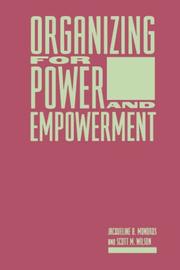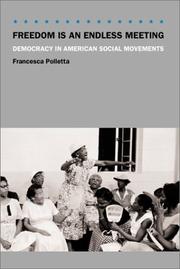| Listing 1 - 6 of 6 |
Sort by
|

ISBN: 0231515057 9780231515054 0231067186 9780231067188 0231067194 9780231067195 Year: 2010 Publisher: New York Columbia University Press
Abstract | Keywords | Export | Availability | Bookmark
 Loading...
Loading...Choose an application
- Reference Manager
- EndNote
- RefWorks (Direct export to RefWorks)
Designed to help build powerful community organizations, empower ordinary citizens to become leaders, and bring about major social and economic change, this book offers a coherent practice-based framework for understanding social action, with power and empowerment at the center of analysis. Topics include recruiting members, consensus building, leadership, publicity, and fundraising.
Book
ISSN: 16295455 ISBN: 9782912107862 2912107865 Year: 2016 Publisher: Paris : Raisons d'agir,
Abstract | Keywords | Export | Availability | Bookmark
 Loading...
Loading...Choose an application
- Reference Manager
- EndNote
- RefWorks (Direct export to RefWorks)
Community organization --- Political participation --- Working class --- Social change --- Organisation communautaire --- Participation politique --- Travailleurs --- Changement social --- History --- Political activity --- Histoire --- Activité politique --- Manifestation --- --États-Unis --- --Militarism --- Égalité --- --Manifestation --- --Political participation --- Activité politique --- Manifestations --- Militantisme --- Participation sociale --- Militarism - United States --- Political participation - United States - History - 21st century --- Working class - Political activity - United States --- Community organization - United States - History - 21st century --- Political participation - United States - History - 20th century --- Community organization - United States - History - 20th century --- États-Unis --- Militarism
Book
ISBN: 0231033931 9780231033930 Year: 1973 Volume: 2 Publisher: New York (N.Y.): Columbia university press
Abstract | Keywords | Export | Availability | Bookmark
 Loading...
Loading...Choose an application
- Reference Manager
- EndNote
- RefWorks (Direct export to RefWorks)
Community organization --- Community development, Urban --- -Community organization --- -#SBIB:316.8H23 --- CBOs (Community organization) --- Community-based organizations --- Community councils --- Community life --- Community programs, Urban --- Neighborhood improvement programs --- Urban community development --- Urban economic development --- City planning --- Sociology, Urban --- Urban policy --- Welzijnsorganisatie: samenlevingsopbouw, opbouwwerk --- Citizen participation --- Government policy --- Social aspects --- #SBIB:316.8H23 --- Community organization - United States --- Community development, Urban - United States

ISBN: 0226924289 1299104673 9780226924281 0226674487 9780226674483 0226674495 9780226674490 9780224674492 0226674487 9780226674483 Year: 2002 Publisher: Chicago University of Chicago Press
Abstract | Keywords | Export | Availability | Bookmark
 Loading...
Loading...Choose an application
- Reference Manager
- EndNote
- RefWorks (Direct export to RefWorks)
Freedom Is an Endless Meeting offers vivid portraits of American experiments in participatory democracy throughout the twentieth century. Drawing on meticulous research and more than one hundred interviews with activists, Francesca Polletta challenges the conventional wisdom that participatory democracy is worthy in purpose but unworkable in practice. Instead, she shows that social movements have often used bottom-up decision making as a powerful tool for political change. Polletta traces the history of democracy in early labor struggles and pre-World War II pacifism, in the civil rights, new left, and women's liberation movements of the sixties and seventies, and in today's faith-based organizing and anti-corporate globalization campaigns. In the process, she uncovers neglected sources of democratic inspiration-Depression-era labor educators and Mississippi voting registration workers, among them-as well as practical strategies of social protest. But Freedom Is an Endless Meeting also highlights the obstacles that arise when activists model their democracies after familiar nonpolitical relationships such as friendship, tutelage, and religious fellowship. Doing so has brought into their deliberations the trust, respect, and caring typical of those relationships. But it has also fostered values that run counter to democracy, such as exclusivity and an aversion to rules, and these have been the fault lines around which participatory democracies have often splintered. Indeed, Polletta attributes the fragility of the form less to its basic inefficiency or inequity than to the gaps between activists' democratic commitments and the cultural models on which they have depended to enact those commitments. The challenge, she concludes, is to forge new kinds of democratic relationships, ones that balance trust with accountability, respect with openness to disagreement, and caring with inclusiveness. For anyone concerned about the prospects for democracy in America, Freedom Is an Endless Meeting will offer abundant historical, theoretical, and practical insights. "This is an excellent study of activist politics in the United States over the past century. . . . Assiduously researched, impressively informed by a great number of thoughtful interviews with key members of American social movements, and deeply engaged with its subject matter, the book is likely to become a key text in the study of grass-roots democracy in America."-Kate Fullbrook, Times Literary Supplement "Polletta's portrayal challenges the common assumption that morality and strategy are incompatible, that those who aim at winning must compromise principle while those who insist on morality are destined to be ineffective. . . . Rather than dwell on trying to explain the decline of 60s movements, Polletta shows how participatory democracy has become the guiding framework for many of today's activists."-Richard Flacks, Los Angeles Times Book Review "In Freedom Is an Endless Meeting, Francesca Polletta has produced a remarkable work of historical sociology. . . . She provides the fullest theoretical work of historical sociology. . . . She provides the fullest theoretical picture of participatory democracy, rich with nuance, ambiguity, and irony, that this reviewer has yet seen. . . . This wise book should be studied closely by both academics and by social change activists."-Stewart Burns, Journal of American History
Social movements --- Community organization --- Political participation --- Group decision making --- Collective decision making --- Decision-making, Group --- Decision making --- Social movements - United States --- Community organization - United States --- Political participation - United States --- Group decision-making - United States --- Mouvements sociaux --- Organisation communautaire --- Participation politique --- Décision de groupe --- Group decision-making
Book
ISBN: 0691093636 1322883440 0691613486 1400868742 0691028184 0691641277 9780691093635 Year: 1975 Publisher: Princeton (N.J.): University press
Abstract | Keywords | Export | Availability | Bookmark
 Loading...
Loading...Choose an application
- Reference Manager
- EndNote
- RefWorks (Direct export to RefWorks)
Since the end of the civil rights era in the sixties it has become increasingly clear that social and political conflicts cannot be resolved entirely at the national level. Struggles between residents of poor neighborhoods and local interest groups or public authorities present some of our most explosive domestic political problems today. This study seeks insight into these problems through an analysis of efforts during the sixties to organize the poor to pursue their interests in local decision-making processes. David J. O'Brien holds that both organizers and scholarly observers of the grass-roots movement have failed to understand properly the process by which interest groups are formed. Arguing that the demise of neighborhood organization cannot be attributed to supposedly unique social, psychological, or cultural characteristics of the poor, he develops an analytical framework that emphasizes the strategic role of incentives and organizational resource problems. This framework helps explain not only the failure of organizers in the sixties to grasp the problems of interest group formation, but also the assumptions that prevented them from identifying the source of their frustration. The author assesses the different approaches that have been taken to neighborhood organization, and outlines a model for future efforts.Originally published in 1976.The Princeton Legacy Library uses the latest print-on-demand technology to again make available previously out-of-print books from the distinguished backlist of Princeton University Press. These editions preserve the original texts of these important books while presenting them in durable paperback and hardcover editions. The goal of the Princeton Legacy Library is to vastly increase access to the rich scholarly heritage found in the thousands of books published by Princeton University Press since its founding in 1905.
Community power --- Community organization --- Poor --- Political sociology --- -Community power --- -Political sociology --- -#SBIB:316.8H30 --- #SBIB:316.8H23 --- Disadvantaged, Economically --- Economically disadvantaged --- Impoverished people --- Low-income people --- Pauperism --- Poor, The --- Poor people --- Persons --- Social classes --- Poverty --- Mass political behavior --- Political behavior --- Political science --- Sociology --- Elite (Social sciences) --- Local government --- Power (Social sciences) --- Sociology, Urban --- CBOs (Community organization) --- Community-based organizations --- Community councils --- Community life --- Professies en methoden in het welzijnswerk: sociaal werk, vrijwilligerswerk, hulpverleningsmethoden … --- Welzijnsorganisatie: samenlevingsopbouw, opbouwwerk --- Economic conditions --- Sociological aspects --- #SBIB:316.8H30 --- Political sociology. --- Community power - United States --- Community organization - United States --- Poor - United States
Book
ISBN: 0923993568 9780923993566 9780923993535 Year: 2014 Publisher: [Place of publication not identified] Kettering Foundation
Abstract | Keywords | Export | Availability | Bookmark
 Loading...
Loading...Choose an application
- Reference Manager
- EndNote
- RefWorks (Direct export to RefWorks)
Community organization - United States. --- Political participation --- Community organization --- Political culture --- Public opinion --- Democracy --- Political Rights - U.S. --- Government - U.S. --- Law, Politics & Government --- Self-government --- Political science --- Equality --- Representative government and representation --- Republics --- Democracy. --- United States. --- ABŞ --- ABSh --- Ameerika Ühendriigid --- America (Republic) --- Amerika Birlăshmish Shtatlary --- Amerika Birlăşmi Ştatları --- Amerika Birlăşmiş Ştatları --- Amerika ka Kelenyalen Jamanaw --- Amerika Qūrama Shtattary --- Amerika Qŭshma Shtatlari --- Amerika Qushma Shtattary --- Amerika (Republic) --- Amerikai Egyesült Államok --- Amerikanʹ Veĭtʹsėndi͡avks Shtattnė --- Amerikări Pĕrleshu̇llĕ Shtatsem --- Amerikas Forenede Stater --- Amerikayi Miatsʻyal Nahangner --- Ameriketako Estatu Batuak --- Amirika Carékat --- AQSh --- Ar. ha-B. --- Arhab --- Artsot ha-Berit --- Artzois Ha'bris --- Bí-kok --- Ē.P.A. --- É.-U. --- EE.UU. --- Egyesült Államok --- ĒPA --- Estados Unidos --- Estados Unidos da América do Norte --- Estados Unidos de América --- Estaos Xuníos --- Estaos Xuníos d'América --- Estatos Unitos --- Estatos Unitos d'America --- Estats Units d'Amèrica --- Ètats-Unis d'Amèrica --- États-Unis d'Amérique --- ÉU --- Fareyniḳṭe Shṭaṭn --- Feriene Steaten --- Feriene Steaten fan Amearika --- Forente stater --- FS --- Hēnomenai Politeiai Amerikēs --- Hēnōmenes Politeies tēs Amerikēs --- Hiwsisayin Amerikayi Miatsʻeal Tērutʻiwnkʻ --- Istadus Unidus --- Jungtinės Amerikos valstybės --- Mei guo --- Mei-kuo --- Meiguo --- Mî-koet --- Miatsʻyal Nahangner --- Miguk --- Na Stàitean Aonaichte --- NSA --- S.U.A. --- SAD --- Saharat ʻAmērikā --- SASht --- Severo-Amerikanskie Shtaty --- Severo-Amerikanskie Soedinennye Shtaty --- Si͡evero-Amerikanskīe Soedinennye Shtaty --- Sjedinjene Američke Države --- Soedinennye Shtaty Ameriki --- Soedinennye Shtaty Severnoĭ Ameriki --- Soedinennye Shtaty Si͡evernoĭ Ameriki --- Spojené obce severoamerické --- Spojené staty americké --- SShA --- Stadoù-Unanet Amerika --- Stáit Aontaithe Mheiriceá --- Stany Zjednoczone --- Stati Uniti --- Stati Uniti d'America --- Stâts Unîts --- Stâts Unîts di Americhe --- Steatyn Unnaneysit --- Steatyn Unnaneysit America --- SUA --- Sŭedineni amerikanski shtati --- Sŭedinenite shtati --- Tetã peteĩ reko Amérikagua --- U.S. --- U.S.A. --- United States of America --- Unol Daleithiau --- Unol Daleithiau America --- Unuiĝintaj Ŝtatoj de Ameriko --- US --- USA --- Usono --- Vaeinigte Staatn --- Vaeinigte Staatn vo Amerika --- Vereinigte Staaten --- Vereinigte Staaten von Amerika --- Verenigde State van Amerika --- Verenigde Staten --- VS --- VSA --- Wááshindoon Bikéyah Ałhidadiidzooígíí --- Wilāyāt al-Muttaḥidah --- Wilāyāt al-Muttaḥidah al-Amirīkīyah --- Wilāyāt al-Muttaḥidah al-Amrīkīyah --- Yhdysvallat --- Yunaeted Stet --- Yunaeted Stet blong Amerika --- ZDA --- Združene države Amerike --- Zʹi͡ednani Derz͡havy Ameryky --- Zjadnośone staty Ameriki --- Zluchanyi͡a Shtaty Ameryki --- Zlucheni Derz͡havy --- ZSA
| Listing 1 - 6 of 6 |
Sort by
|

 Search
Search Feedback
Feedback About UniCat
About UniCat  Help
Help News
News